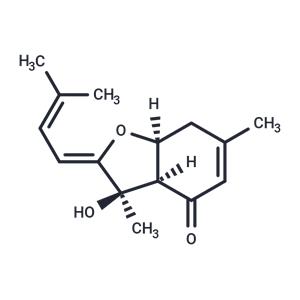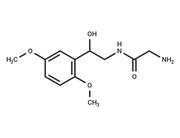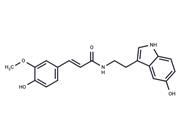| Name | Bisabolangelone |
| Description | Bisabolangelone has anti-tumor, anti-inflammatory, anti-microbial, and antioxidant activities, it inhibits dendritic cell functions by blocking MAPK and NF-κB signaling. |
| In vitro | Bisabolangelone (BISA), isolated from the roots of Angelica koreana, has many pharmacological activities, such as anti-tumor, anti-microbial, antioxidant, and anti-inflammatory activities. BISA attenuated the production of pro-inflammatory cytokines including interleukin (IL)-12, IL-1β, and tumor necrosis factor-alpha (TNF-α), migration to macrophage inflammatory protein-3 beta, and allo-T cell activating ability of DCs. In addition, BISA affected endocytosis of DCs. Molecular studies showed that BISA suppressed MAPK phosphorylation and nuclear translocation of NF-κB p50/p65. BISA inhibited DC functions by blocking MAPK and NF-κB signaling[2].
|
| Storage | Powder: -20°C for 3 years | In solvent: -80°C for 1 year | Shipping with blue ice. |
| Solubility Information | DMSO : 25 mg/mL (100.68 mM)
|
| Keywords | Inhibitor | inhibit | p38 MAPK | Bisabolangelone |
| Inhibitors Related | Adezmapimod | Exarafenib | Doramapimod | Vemurafenib | CMPD1 | SKLB-163 | sodium lauroyl-α-hydroxyethyl sulfonate | Bakuchiol | Takinib | SB 202190 | NG25 | MW-150 |
| Related Compound Libraries | Anti-Tumor Natural Product Library | Traditional Chinese Medicine Monomer Library | Bioactive Compound Library | Selected Plant-Sourced Compound Library | Kinase Inhibitor Library | Natural Product Library | Anti-Inflammatory Traditional Chinese Medicine Compound Library | Natural Product Library for HTS | Bioactive Compounds Library Max | Anti-Cancer Active Compound Library |

 United States
United States



